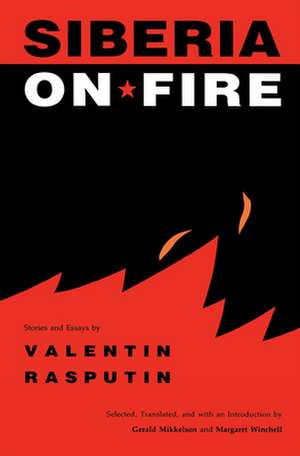Siberia on Fire: Stories and Essays: NIU Series in Slavic, East European, and Eurasian Studies
Autor Valentin Rasputinen Limba Engleză Paperback – 30 sep 1989
Siberia on Fire brings together some of the best stories and essays by Valentin Rasputin, widely regarded as the finest writer in the Soviet Union today. Although the people and places that make up his fiction are characteristically Siberian, Rasputin's broad appeal and international recognition stem from universal themes—the interdependent elements of nature; the cultural and historical continuum maintained by past, present, and future generations; and the clash between modern and traditional mores.
Rasputin was born in a small Siberian village on the Angara River in 1937 and educated at Irkutsk University. His work displays his continuing concern about the economic development of the vast wilderness of Siberia and its effects on the land and the people. Siberia has undergone monumental changes brought on by the excesses of Stalinism in the twenties and thirties, the losses and deprivations during World War II, and the massive construction and modernization projects of more recent decades. A prominent feature of Rasputin's fiction, often associated with the "village prose" movement, is the portrayal of a traditional way of life that is vanishing along with huge tracts of forests and three-hundred-year-old villages.
Rasputin was born in a small Siberian village on the Angara River in 1937 and educated at Irkutsk University. His work displays his continuing concern about the economic development of the vast wilderness of Siberia and its effects on the land and the people. Siberia has undergone monumental changes brought on by the excesses of Stalinism in the twenties and thirties, the losses and deprivations during World War II, and the massive construction and modernization projects of more recent decades. A prominent feature of Rasputin's fiction, often associated with the "village prose" movement, is the portrayal of a traditional way of life that is vanishing along with huge tracts of forests and three-hundred-year-old villages.
Din seria NIU Series in Slavic, East European, and Eurasian Studies
-
 Preț: 138.18 lei
Preț: 138.18 lei -
 Preț: 89.68 lei
Preț: 89.68 lei -
 Preț: 197.11 lei
Preț: 197.11 lei -
 Preț: 185.88 lei
Preț: 185.88 lei -
 Preț: 239.52 lei
Preț: 239.52 lei -
 Preț: 214.65 lei
Preț: 214.65 lei - 19%
 Preț: 369.08 lei
Preț: 369.08 lei -
 Preț: 130.71 lei
Preț: 130.71 lei -
 Preț: 216.21 lei
Preț: 216.21 lei -
 Preț: 219.33 lei
Preț: 219.33 lei -
 Preț: 114.05 lei
Preț: 114.05 lei -
 Preț: 238.40 lei
Preț: 238.40 lei -
 Preț: 169.95 lei
Preț: 169.95 lei -
 Preț: 216.01 lei
Preț: 216.01 lei -
 Preț: 205.71 lei
Preț: 205.71 lei -
 Preț: 351.49 lei
Preț: 351.49 lei -
 Preț: 153.39 lei
Preț: 153.39 lei -
 Preț: 185.82 lei
Preț: 185.82 lei -
 Preț: 127.66 lei
Preț: 127.66 lei -
 Preț: 200.18 lei
Preț: 200.18 lei -
 Preț: 131.46 lei
Preț: 131.46 lei -
 Preț: 285.24 lei
Preț: 285.24 lei -
 Preț: 191.59 lei
Preț: 191.59 lei -
 Preț: 175.99 lei
Preț: 175.99 lei -
 Preț: 179.03 lei
Preț: 179.03 lei -
 Preț: 215.94 lei
Preț: 215.94 lei -
 Preț: 150.97 lei
Preț: 150.97 lei -
 Preț: 177.43 lei
Preț: 177.43 lei -
 Preț: 255.55 lei
Preț: 255.55 lei -
 Preț: 185.25 lei
Preț: 185.25 lei -
 Preț: 255.62 lei
Preț: 255.62 lei -
 Preț: 283.86 lei
Preț: 283.86 lei -
 Preț: 136.13 lei
Preț: 136.13 lei -
 Preț: 190.06 lei
Preț: 190.06 lei -
 Preț: 131.39 lei
Preț: 131.39 lei -
 Preț: 201.03 lei
Preț: 201.03 lei -
 Preț: 108.71 lei
Preț: 108.71 lei -
 Preț: 191.37 lei
Preț: 191.37 lei -
 Preț: 136.13 lei
Preț: 136.13 lei -
 Preț: 178.19 lei
Preț: 178.19 lei -
 Preț: 118.20 lei
Preț: 118.20 lei -
 Preț: 261.47 lei
Preț: 261.47 lei -
 Preț: 162.55 lei
Preț: 162.55 lei -
 Preț: 223.70 lei
Preț: 223.70 lei -
 Preț: 270.19 lei
Preț: 270.19 lei -
 Preț: 158.38 lei
Preț: 158.38 lei
Preț: 215.42 lei
Nou
Puncte Express: 323
Preț estimativ în valută:
41.23€ • 44.80$ • 34.66£
41.23€ • 44.80$ • 34.66£
Carte tipărită la comandă
Livrare economică 21 aprilie-05 mai
Preluare comenzi: 021 569.72.76
Specificații
ISBN-13: 9780875805474
ISBN-10: 0875805477
Pagini: 252
Dimensiuni: 152 x 229 x 20 mm
Greutate: 0.39 kg
Editura: Northern Illinois University Press
Colecția Northern Illinois University Press
Seria NIU Series in Slavic, East European, and Eurasian Studies
ISBN-10: 0875805477
Pagini: 252
Dimensiuni: 152 x 229 x 20 mm
Greutate: 0.39 kg
Editura: Northern Illinois University Press
Colecția Northern Illinois University Press
Seria NIU Series in Slavic, East European, and Eurasian Studies
Recenzii
"Dazzling stories."—Publishers Weekly
"The quality of the translations is uniformly high, an impressive achievement."—New York Times Book Review
"A fine translation of Valentin Rasputin's works, appropriate for use in college and university literature classes."—World Literature Today
"The quality of the translations is uniformly high, an impressive achievement."—New York Times Book Review
"A fine translation of Valentin Rasputin's works, appropriate for use in college and university literature classes."—World Literature Today
Cuprins
Table of Contents
Introduction
Fiction
Vasily and Vasilia (1966)
French Lessons (1973)
Live and Love (1981)
What Should I Tell the Crow? (1981)
The Fire (1985)
Auntie Ulita (1985)
Essays
Your Siberia and Mine (1984)
How Did They End Up in Irkutsk? (1984)
Baikal (1981)
What We Have: A Baikal Prologue Without an Epilogue (1987)
Your Son, Russia, and Our Passionate Brother: On Vasily Shukshin (1984)
The Truths of Aleksandr Vampilov (1977)
Appendix
Bibliography of Major Works by Valentin Rasputin
Fiction
Vasily and Vasilia (1966)
French Lessons (1973)
Live and Love (1981)
What Should I Tell the Crow? (1981)
The Fire (1985)
Auntie Ulita (1985)
Essays
Your Siberia and Mine (1984)
How Did They End Up in Irkutsk? (1984)
Baikal (1981)
What We Have: A Baikal Prologue Without an Epilogue (1987)
Your Son, Russia, and Our Passionate Brother: On Vasily Shukshin (1984)
The Truths of Aleksandr Vampilov (1977)
Appendix
Bibliography of Major Works by Valentin Rasputin
Descriere
Siberia on Fire brings together some of the best stories and essays by Valentin Rasputin, widely regarded as the finest writer in the Soviet Union today. Although the people and places that make up his fiction are characteristically Siberian, Rasputin's broad appeal and international recognition stem from universal themes—the interdependent elements of nature; the cultural and historical continuum maintained by past, present, and future generations; and the clash between modern and traditional mores.
Rasputin was born in a small Siberian village on the Angara River in 1937 and educated at Irkutsk University. His work displays his continuing concern about the economic development of the vast wilderness of Siberia and its effects on the land and the people. Siberia has undergone monumental changes brought on by the excesses of Stalinism in the twenties and thirties, the losses and deprivations during World War II, and the massive construction and modernization projects of more recent decades. A prominent feature of Rasputin's fiction, often associated with the "village prose" movement, is the portrayal of a traditional way of life that is vanishing along with huge tracts of forests and three-hundred-year-old villages.
Rasputin was born in a small Siberian village on the Angara River in 1937 and educated at Irkutsk University. His work displays his continuing concern about the economic development of the vast wilderness of Siberia and its effects on the land and the people. Siberia has undergone monumental changes brought on by the excesses of Stalinism in the twenties and thirties, the losses and deprivations during World War II, and the massive construction and modernization projects of more recent decades. A prominent feature of Rasputin's fiction, often associated with the "village prose" movement, is the portrayal of a traditional way of life that is vanishing along with huge tracts of forests and three-hundred-year-old villages.

















